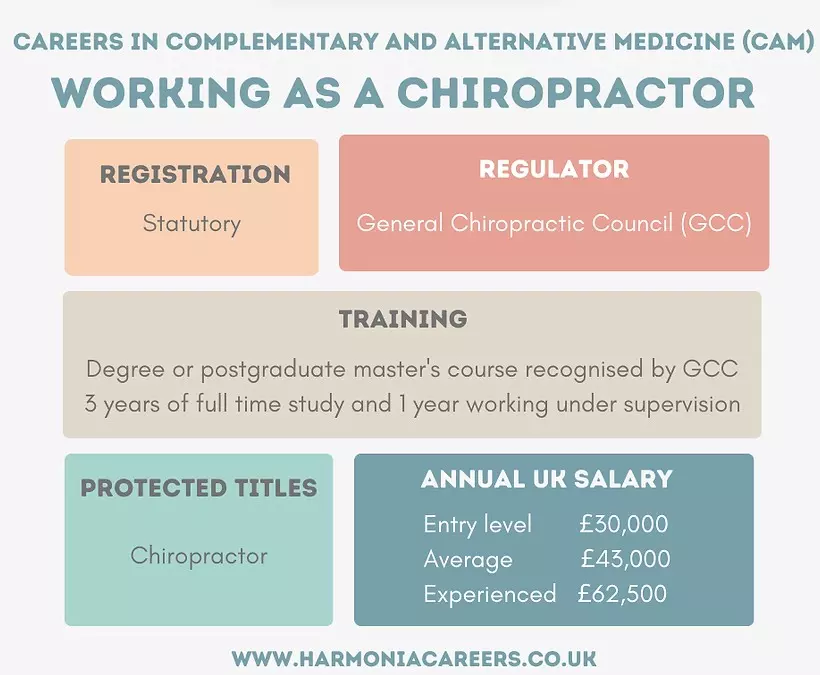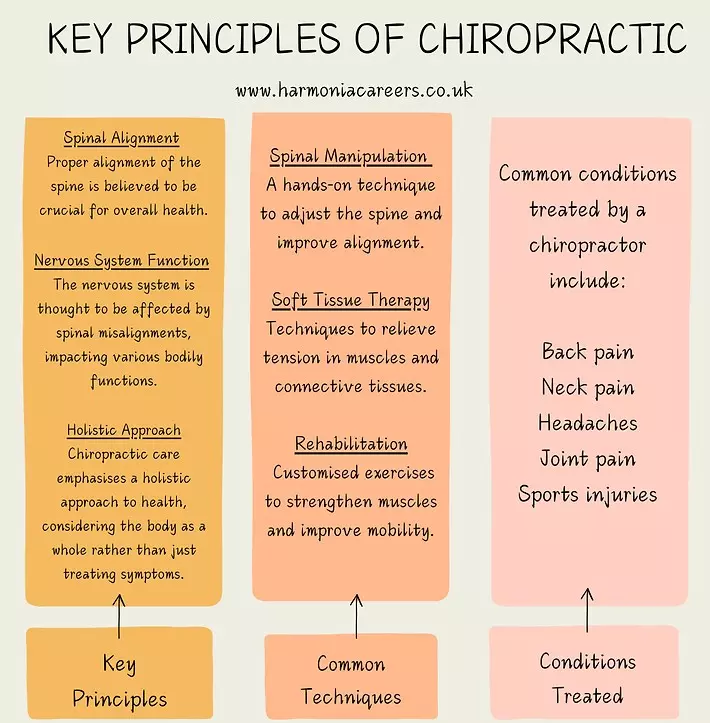
2 Apr 2025 ● Harmonia Careers
How to become a Chiropractor

What is a chiropractor?
Chiropractic care is generally considered a form of complementary and alternative medicine (CAM). Chiropractors use hands-on spinal manipulation and other manual techniques to align the body's musculoskeletal structure, enabling the body to heal itself without surgery or medication.
If you have...
- a keen interest, or education in, understanding of human anatomy and physiology;
- excellent manual dexterity and coordination;
- good communication skills to explain treatment plans and procedures to patients;
- the ability to assess and diagnose various musculoskeletal conditions;
A career in chiropractic care could be for you!
As the demand for alternative and holistic health care continues to grow, find out what it takes to become a chiropractor in our easy-to-read guide.
What is Chiropractic care?
Chiropractic care is a complementary healthcare discipline focused on diagnosing and treating mechanical disorders of the musculoskeletal system, particularly the spine. It is based on the premise that these disorders can affect general health through the nervous system.
Chiropractors primarily use manual manipulation and other manual techniques to treat patients, aiming to restore proper function and alignment to the body.

How to become a qualified chiropractor
1. Regulation
In the UK, chiropractors must be registered with the General Chiropractic Council (GCC) to practice. The GCC only accepts chiropractors who have the correct qualifications and registrants must follow the standards set out in the GCC's Code of Practice.
'Chiropractor' is a protected title, so practitioners using a protected title without registration is illegal and can result in prosecution.
2. Training
To become a chiropractor in the UK, you need to complete a degree or postgraduate master's course recognised by the General Chiropractic Council. If you already hold a minimum BSc degree in a health sciences subject, you may be eligible to complete a postgraduate conversion course.
Chiropractic training typically involves:
- Education: Coursework in anatomy, physiology, pathology, and diagnostic imaging
- Clinical training: Supervised clinical training to develop practical skills and treat real patients
- Research: Staying informed about the latest research and advancements in chiropractic care.
3. Professional Registration
Once qualified, in order to practise, you must register with the General Chiropractic Council (GCC) which is a professional regulator overseen by the Professional Standards Authority.
Chiropractors will often join professional bodies as a member, for example, the Royal College of Chiropractors (RCC) to ensure they meet high standards of practice, maintain professional development, and contribute to the reputation and recognition of the profession, ultimately benefiting patients and the healthcare system.
Where do Chiropractors work?
Chiropractors in the UK are not medical doctors, but they focus on the musculoskeletal system and its effect on overall health. Most chiropractors work in the private sector, but chiropractic may be available on the NHS in some areas.
Setting Up a Private Practice
If being self-employed is for you, consider these options for your practice:
- Self-employed Practice:
Either create a welcoming atmosphere in your home, or at a rented clinic space, to attract private clients seeking a comfortable environment.
- Partnerships with Wellness Centres:
Collaborating with spas or holistic clinics to work from their space, or to work with their clients, can provide a steady stream of clients while positioning you as a professional in an established setting.
Employment Opportunities
If you prefer a traditional workplace, numerous roles are available, including:
- Spas and Wellness Centres:
These facilities often hire practitioners trained in complementary therapies like acupuncture and acupressure to enhance their clients’ wellness experience alongside other treatments.
- Hospitals and Healthcare Facilities:
In some cases, chiropractic treatment can be offered on the NHS, but there are also other private healthcare settings who seek full and part time chiropractors for their services.
Specialisms beyond basic training
Chiropractors in the UK can specialise in a variety of areas, including:
- Sports - working with athletes to improve performance, prevent injuries, and help with recovery
- Paediatrics - caring for babies, children, and teenagers, for conditions like colic, ear infections, and developmental delays
- Geriatrics - specialising in the care of the elderly
- Neurology - focusing on neurological issues
- Orthopaedics - specialising in orthopaedic issues
- Rehabilitation: - focusing on rehabilitation and exercise programmes
- Pregnancy - working with antenatal and postnatal mothers
Chiropractors may also wanted to broaden their skillset with additional techniques, such as;
- Acupuncture
- Nutrition counselling
- Exercise prescription
- Blood pressure checks, Blood tests, and X-rays
Career progression
Practising as a full-time clinician, or combining the roles of clinician and business owner, are fulfilling and rewarding career paths. But they are not the only options. Chiropractors can choose many other career options as alternatives to clinical practice or add breadth and variety to their role in private practice.
Why choose a career in chiropractic?
Choosing a career in chiropractic can be incredibly fulfilling, as you help alleviate pain and improve the quality of life for your clients.
The chiropractic industry is growing, with an employment growth rate of nine percent by 2032.
Chiropractic care focuses on the body’s natural ability to heal itself, promoting overall wellness, and there is a growing demand for chiropractic service as more people seek alternative health care options, so now could be the right time for you to start your journey.


